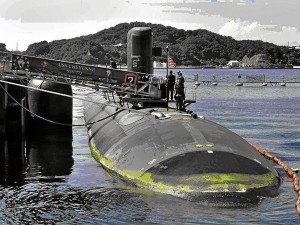
‘TOM CLANCY’S SUB’ The USS Cheyenne (SSN 773), a Los Angeles-class submarine, is scheduled to arrive in Subic Bay Friday for a routine port visit. This stop in Subic will permit the Cheyenne to replenish supplies as well as offer its crew an opportunity for rest and relaxation. Cheyenne is the primary subject of Tom Clancy’s novel “SNN,” a fictional war over the Spratlys. PHOTO FROM US EMBASSY INFORMATION OFFICE
MANILA, Philippines—The port visit of the USS Cheyenne, a nuclear attack submarine belonging to the US Pacific Fleet, has been cleared with Malacañang.
Deputy presidential spokesperson Abigal Valte said that although Cheyenne is a “nuclear-powered submarine,” this does not necessarily mean that it is carrying nuclear warheads.
The Cheyenne arrived on Friday at the former US naval base on Subic Bay, Zambales, for a “routine port visit,” according to the US Embassy.
The US Embassy in Manila did not say how long the 110-meter-long submarine would stay in the Philippines.
But Subic Bay Metropolitan Authority (SBMA) chair Roberto Garcia said the USS Cheyenne would be in Subic for a week.
At a briefing in the Palace, Valte clarified that the port visit was not violative of the constitutional ban on the presence of any nuclear armaments in the country.
Nuke-powered
“Just to clarify, the Constitution prohibits nuclear armaments, not nuclear-powered (vessels). So this is nuclear-powered and this has diplomatic clearance of the DFA, in consultation with the Department of National Defense and our Navy, for a routine ship replenishment,” said Valte.
She said that port calls of US forces were under the auspices of the Visiting Forces Agreement.
“If they need to make a brief stop in Subic, they ask permission from us, providing us with the reason for doing so. In this case, it’s a regular ship replenishment, and we give permission if their documents are in order,” she said.
Since the submarine will be underwater, the Philippine government expects the crew of Cheyenne to “take all the necessary precautions,” said Valte.
On its arrival in Subic, the Cheyenne was welcomed by city officials and residents because of the visit’s perceived boost to local tourism.
‘Always welcome’
Olongapo City Mayor James Gordon Jr. said the US Navy is “always welcome here.”
At about 9 a.m., the Cheyenne moored at the Alava Pier, assisted by tugboats, while vendors displayed their stocks hoping to catch the attention of American personnel who would wander towards nearby bars, hotels, and malls.
As news spread in the Subic free port that the Cheyenne was here for a routine port call, Subic’s tourism-oriented enterprises immediately came to life.
Elsa Santos, 47, a T-shirt vendor, said any American vessel that docks here “means our incomes [will rise].” Although she operates a store in neighboring Olongapo City, Santos said it is “much better to come here because we can sell [our products] at a premium compared to what we can sell in our stores.”
Wood carvings and various other items have already been set up, and have been a semi-permanent presence in front of Alava Pier, where US vessels dock.
“They [Americans] really like souvenirs,” Santos said.
The port visit will allow Cheyenne’s 129 sailors to have rest and recreation in the former US naval base, the largest overseas naval base of America until it was shut down in 1991.
The Subic naval base played a crucial role in the Vietnam and Korean War, and for most of the Cold War era between the US and the defunct USSR.
Same route as Guardian
Cheyenne, reportedly headed for Indonesia, will pass through the route taken by USS Guardian, which remains stuck in the Tubbataha Reefs, a Unesco-World Heritage Site in the Sulu Sea.
The US Pacific Fleet describes Cheyenne as “one of the most capable nuclear attack submarines in the world.”
Commissioned in 1996, the Cheyenne left port in Pearl Harbor, Hawaii, in December for a six-month deployment to the Western Pacific, the US Navy said on its website.
The US nuclear submarine has figured in Tom Clancy’s fictional novel “SSN,” where the Cheyenne battles China’s People’s Liberation Army warships in the disputed Spratly Islands in the West Philippine Sea (South China Sea).
The US Navy website says the submarine is armed with harpoons, Tomahawk missiles and torpedoes and is capable of laying mines. With a report from Robert Gonzaga, Inquirer Central Luzon